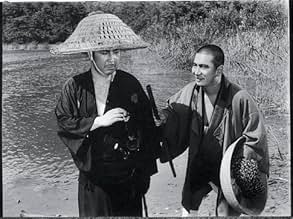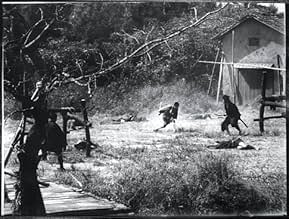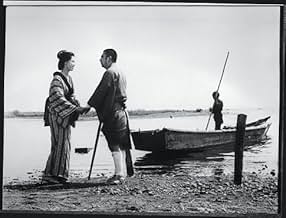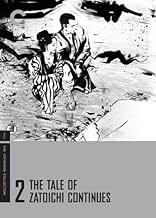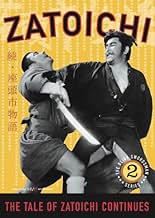IMDb रेटिंग
7.2/10
2.9 हज़ार
आपकी रेटिंग
अपनी भाषा में प्लॉट जोड़ेंThe blind masseur and swordsman, Zatoichi, learns of a powerful political figure's secret and is quickly tailed by a group of killers.The blind masseur and swordsman, Zatoichi, learns of a powerful political figure's secret and is quickly tailed by a group of killers.The blind masseur and swordsman, Zatoichi, learns of a powerful political figure's secret and is quickly tailed by a group of killers.
Yaeko Mizutani
- Setsu
- (as Yoshie Mizutani)
Tomisaburô Wakayama
- Nagisa no Yoshiro
- (as Jô Kenzaburô)
फ़ीचर्ड समीक्षाएं
This movie is, I guess, the first of the very long & very excellent zato-ichi series starring the incomparable Shintaro Katsu who also starred in the shorter but every bit as impressive if quite different series: The Razor. I lived in San Francisco in the 1960s & 1970s & used to go watch these films every week at the Japanese theater in the old "Japan Town". Loved them then, love them now. This film in particular is a classic in every way: cinematographically it looks like Eisenstein - every shot a classic. The compositions, textures & tonalities are breathtakingly beautiful. Dramatically, it's every bit as gripping as Yojimbo or the best Ford westerns (e.g. Stagecoach). And finally the sword-fight choreography - None better. Terrific movie!
'The Tale Of Zatoichi Continues (1962)' works both as a stand-alone experience and a direct continuation of its predecessor, playing with similar themes but framing them through a lens soaked with regret. It's a shorter, more action-packed affair but it's still primarily a character study. The eponymous stoic swordsman unwillingly gets caught up in the kind of trouble that forces him to show off his skills, which tend to swiftly and decisively resolve his immediate issues. Most of his introspection surrounds the melancholy of the last movie's events. Towards the end, however, a new relationship is revealed that threatens to see history repeat itself. Katsu, who's still fantastic in the role, is joined by his brother - perhaps better known for the much pulpier 'Lone Wolf and Cub (1972-1976)' series - which results in most of the film's emotion. It's rather resonant, leaving the entire experience tinged in sadness. The focus on character is, essentially, what makes the film so successful. You care about all the major players and their struggles resonate with you. The narrative moves almost as swiftly as Zatoichi's sword, ultimately coming to an incredibly abrupt end, and it balances its tone perfectly. It isn't groundbreaking but it's very enjoyable. It's also very well-made. Its crisp black-and-white cinematography is often highlighted by stunning chiaroscuro lighting and absolutely perfect composition, its dialogue is to the point but never on the nose, and its acting is subtle but successful. When it comes to the action, the thing doesn't disappoint, either. Most of it is shot wide, allowing you to see every quick-moving moment uninterrupted, and the choreography dances between unbearable anticipation and samurai-slaying pay-off impeccably. It isn't perfectly clean, with the villains scrambling about in fear before they make their ill-fated attempt on our often almost clumsy but always keenly aware protagonist, which lends a lot of credence to the fact that it's supposed to involve a highly feared yet blind man. Overall, the picture is very entertaining. It won't change your life, but it'll make you smile more than once. 7/10
Seen on YouTube in black and white and, checking on
IMDb, it is in black and white. Beautiful music as usual, captivating story as usual, good acting and, especially, notable female beauties such as Masayo Banri and Yaeko Mizutani, two very beautiful Japanese women. Mixture inspired by drama and action, worth seeing.
The following review is an extract from the book "Shintaro Katsu´s Zatoichi: Complete guide to all movies", which is now available on Amazon.
Zatoichi (Shintaro Katsu), the famous and prodigious masseur and blind swordsman, has arrived in a new region after the adventures narrated in the first film. After confronting some arrogant soldiers, who throw him into the water when they discover him in the boat in which they were crossing a river, he is hired to massage the head of a samurai detachment. However, while he is doing this work, he indiscreetly discovers a secret of the lord ("I had never had a client like this one..."), so the samurai will persecute him with the intention of killing him.
(...)
Second part of a long line of films with the mythical blind masseur, hardened player and wandering swordsman Zatoichi as the protagonist. The actor who gives life to the character is, once again, the great Shintaro Katsu. The director of this second part is not Kenji Misumi, but another director (Kazuo Mori). The sequel to "Zatoichi monogatari" (shot the same year, 1962) is not at the same level as the original. There are some gaps in the story; for example, it is never quite clear why the samurai want to kill Zatoichi (What is the secret that the masseur has discovered about the lord? It must be such a big secret that not even the spectator has the right to know...
In any case, Zoku Zatôichi monogatari's viewing is a good opportunity to see Shintaro Katsu and Tomisaburo Wakayama (Zatoichi and Yoshiro, repectively), two greats of the sixties and seventies chambara, who were also brothers in real life.
Zatoichi (Shintaro Katsu), the famous and prodigious masseur and blind swordsman, has arrived in a new region after the adventures narrated in the first film. After confronting some arrogant soldiers, who throw him into the water when they discover him in the boat in which they were crossing a river, he is hired to massage the head of a samurai detachment. However, while he is doing this work, he indiscreetly discovers a secret of the lord ("I had never had a client like this one..."), so the samurai will persecute him with the intention of killing him.
(...)
Second part of a long line of films with the mythical blind masseur, hardened player and wandering swordsman Zatoichi as the protagonist. The actor who gives life to the character is, once again, the great Shintaro Katsu. The director of this second part is not Kenji Misumi, but another director (Kazuo Mori). The sequel to "Zatoichi monogatari" (shot the same year, 1962) is not at the same level as the original. There are some gaps in the story; for example, it is never quite clear why the samurai want to kill Zatoichi (What is the secret that the masseur has discovered about the lord? It must be such a big secret that not even the spectator has the right to know...
In any case, Zoku Zatôichi monogatari's viewing is a good opportunity to see Shintaro Katsu and Tomisaburo Wakayama (Zatoichi and Yoshiro, repectively), two greats of the sixties and seventies chambara, who were also brothers in real life.
Never mind the first film to take its time in introducing the character to us, of which I am glad that it didn't rush. Now that we and the others in the film "know" him ( although part of the fun is that nobody is really able to know him and his skill really) the film goes to hyperdrive mode straightaway.
It's fascinating to see this in retrospect, knowing it is a long franchise, and trying to map out the development and where the film and its success came from. Inthink the first film is strong because it takes its time in creating its own universe, simply so that the sequels don't have to work so hard in setting things up. It's nice, and so is the self-reference it allows both in humour and mythology, but the films quickly morph into each other. It doesn't seem to be a problem here, since aren't all series all about working for or against the set rules and archetypes in the previous films?
Anyway, I think the two films have very well set up Zatoichi's blindness as a metaphor, yet it's the first film that's more ambitiously conceived. In this respect these two first films are like "Yojimbo" and "Sanjuro", Kurosawa's duology. The last shot of this film, however, is one of the coolest film moments I know of. Seriously. That last five seconds.
It's fascinating to see this in retrospect, knowing it is a long franchise, and trying to map out the development and where the film and its success came from. Inthink the first film is strong because it takes its time in creating its own universe, simply so that the sequels don't have to work so hard in setting things up. It's nice, and so is the self-reference it allows both in humour and mythology, but the films quickly morph into each other. It doesn't seem to be a problem here, since aren't all series all about working for or against the set rules and archetypes in the previous films?
Anyway, I think the two films have very well set up Zatoichi's blindness as a metaphor, yet it's the first film that's more ambitiously conceived. In this respect these two first films are like "Yojimbo" and "Sanjuro", Kurosawa's duology. The last shot of this film, however, is one of the coolest film moments I know of. Seriously. That last five seconds.
क्या आपको पता है
- ट्रिवियाThe Tale of Zatoichi proved to be so popular that this sequel went into production the same year, 1962.
- कनेक्शनFeatured in Best in Action: 1962 (2018)
टॉप पसंद
रेटिंग देने के लिए साइन-इन करें और वैयक्तिकृत सुझावों के लिए वॉचलिस्ट करें
- How long is The Tale of Zatoichi Continues?Alexa द्वारा संचालित
विवरण
- रिलीज़ की तारीख़
- कंट्री ऑफ़ ओरिजिन
- भाषा
- इस रूप में भी जाना जाता है
- The Tale of Zatoichi Continues
- उत्पादन कंपनी
- IMDbPro पर और कंपनी क्रेडिट देखें
- चलने की अवधि1 घंटा 12 मिनट
- रंग
- ध्वनि मिश्रण
- पक्ष अनुपात
- 2.35 : 1
इस पेज में योगदान दें
किसी बदलाव का सुझाव दें या अनुपलब्ध कॉन्टेंट जोड़ें

टॉप गैप
By what name was Zoku Zatôichi monogatari (1962) officially released in India in English?
जवाब
